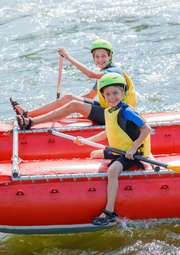Learning Beyond the Classroom: The Value of Experiential School Trips
Taking students out of the classroom and into the real world can be an incredibly valuable experience. Whether it’s a school trip to a museum, theatre performance, historical site, or outdoor adventure, experiential learning complements traditional teaching methods.
School trips give students the opportunity to deepen their understanding of academic topics, develop life skills, and make subject matter come alive.
Seeing Concepts in Action
Visiting places connected to topics they’re studying in school allows students to witness real-world examples first-hand. A physics class trip to a planetarium lets them observe astronomical concepts in action.
Touring an art museum alongside an art history lesson gives texture and context to movements and artists. Ancient ruins, battlefields, and residential trips to historical buildings turn textbook descriptions into tangible realities. Field trips remove abstraction and help cement classroom teachings.
Sparking Interest and Engagement
Experiencing academic concepts up close also tends to pique students’ curiosity and engagement. Seeing Shakespeare performed live often inspires a deeper appreciation than simply reading his work. Students who never showed previous interest in a subject can discover inspiration outside the classroom walls.
Even the most reluctant learners tend to enjoy school trips, finding them more exciting and memorable than sitting at their desks. This marginal increased interest can motivate them to pay more attention back in class.
Developing Critical Thinking and Perception
School trips also present valuable opportunities to practice critical thinking, perception, and analysis skills. Students must interpret what they’re seeing, draw connections to previous lessons, and distil key takeaways. Debriefing and discussions encourage them to ask questions, exchange perspectives, and articulate observations.
Rather than receiving information passively from textbooks or presentations, they must actively evaluate their surroundings. Their perceptive abilities get sharpened in the process.
Gaining Cultural Appreciation
Experiencing different cultural institutions, events, and locales expands a student’s understanding and appreciation of the arts, sciences, and humanities. They gain insight into how others live, broadening their worldviews.
Students exposed to foreign cultures often return with a greater sense of empathy, tolerance, and desire to connect across differences. Even visiting institutions close to home can increase familiarity with the cultural touchstones in their community.
Building Social-Emotional Skills
School trips require students to navigate new environments, exercise independence, collaborate with classmates, and problem-solve. These situations help develop maturity along with practical life abilities. Students must manage logistics like transportation, scheduling, packing appropriately, and following guidelines.
Teachers have opportunities to observe how students apply classroom comportment training in public spaces. Communication flourishes more freely outside the confines of school hallways. Bonds deepen as classmates share novel common experiences.
Creating Lasting Memories
On a good school trip, student chatter tends to bubble with excitement before, during, and long after. When effectively planned, trips supply some of the students’ most treasured school memories. The sights, sounds, tastes, physical encounters, and emotions get etched deeply into their minds. Years later, ask past students what they remember from their school history and they’re likely to describe their fun and educational school trips.
While sitting in a classroom has its place in education, school trips provide invaluable experiential learning opportunities. Students gain exposure to academic concepts in action, increased engagement, critical thinking practice, cultural appreciation, social-emotional skills, and memorable associations.
A Word About Child Safety
Ensuring child safety on a field trip involves planning and the implementation of effective identification methods. Each child should wear a clearly visible ID tag or wristband that includes their name, emergency contact information, and any pertinent medical details. Additionally, children should be grouped with designated chaperones who are briefed on safety protocols and equipped with a list of the children in their care. For longer trips, regular headcounts, established meeting points, and clear communication strategies further enhance safety. These tips will ensure that children remain accounted for and easily identifiable throughout the trip.





